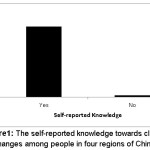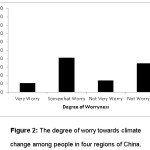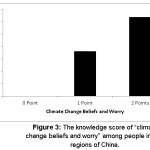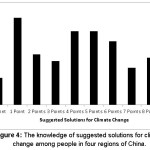Public Knowledge and Awareness of Climate Changes Among People in China
Khalid Al-Mutairi1 * and Hongqu Tang2
1
Department of Biology,
Faculty of Science,
University of Tabuk 71491,
Saudi Arabia
2
Institute of Groundwater and Earth Sciences,
Jinan University,
West of Huangpu Avenue, Guangzhou,
No 601,
China
DOI: http://dx.doi.org/10.12944/CWE.12.2.06
Measuring the public understanding, knowledge and perceptions towards recent climate change is become a growing research interest in the last two decades. The public understanding and knowledge can be measured through in-depth individual interviews, questionnaires and case studies. In the present study, the public awareness and knowledge towards climate change was measured using questionnaire which was distributed among 160 individuals in four regions of China (Shenzhen, Foshan, Zhuhai and Guangzhou). In general, the individuals showed moderate knowledge and understanding about climate change issue causes, impacts and suggested solutions. The items measuring “impacts of climate change” and “suggested solutions” were the only significant variables (P<0.05) in the different regions. Other measures did not show significant different in their scores (P<0.05). The self-reported knowledge was high among the respondents (97.5%) which indicate dependence of individuals in the four regions for traditional knowledge to obtain the recent updates and information about climate change. It is concluded that the public understanding and knowledge among individuals in China is moderate and further efforts needed to be done to improve the general knowledge and perception about climate change issue in the different media resources such as TV and newspaper.
Copy the following to cite this article:
Al-Mutairi K, Tang H. Public Knowledge and Awareness of Climate Changes Among People in China. Curr World Environ 2017;12(2). DOI:http://dx.doi.org/10.12944/CWE.12.2.06
Copy the following to cite this URL:
Al-Mutairi K, Tang H. Public Knowledge and Awareness of Climate Changes Among People in China. Curr World Environ 2017;12(2). Available from: http://www.cwejournal.org/?p=17368
Download article (pdf) Citation Manager Publish History
Select type of program for download
| Endnote EndNote format (Mac & Win) | |
| Reference Manager Ris format (Win only) | |
| Procite Ris format (Win only) | |
| Medlars Format | |
| RefWorks Format RefWorks format (Mac & Win) | |
| BibTex Format BibTex format (Mac & Win) |
Article Publishing History
| Received: | 2017-05-17 |
|---|---|
| Accepted: | 2017-07-16 |
Introduction
It is an acceptable fact among the scientists that there is a relationship between anthropogenic activities and accelerated climate changes such as greenhouse gases which are produced from using the fossil fuels and changing the vegetation cover for the seek of urbanization and development.1 Hence, discussion of the global environmental change (GEC) has been increased among the scientific communities which proved its existence in various parts of the world.2 The term “global warming” denotes the presence of climate change that results in increasing the average temperature in the poles. Intergovernmental panel on climate change [3] has forecasted a possible increase of the average temperature of 1.5 to 4.5°C which may cause high variations in the temperature of the globe.4
The common knowledge is an important source for adaption capability among the people.5 This common ecological knowledge is accumulative outcomes of a knowledge-practice-belief complex, based on different generations and transferring procedures.6 The common knowledge on climate change is very important to change the people attitude which will indirectly be reflected on reducing the adverse effect of climate changes.
According to Semenza et al,7 human beings are currently influencing the complication of the global climate change. This in turns, impact the people in natural systems especially physically and economically vulnerable in the world. [3]. Therefore, individuals (leaders in government, business and normal members of the community) play a vital role in encountering the climate change can significantly act on inspiring and guiding adaptive capabilities to minimize the climate change impacts.8 According to Wolf and Moser [8], prior to discussing the role of the individuals’ to minimize the impacts of the climate changes, it is necessary to differentiate between understanding (which can be defined as acquiring and applying factually correct knowledge of climate change), perception (views and interpretations based on beliefs and understanding), and engagement (a state of personal connection that includes cognitive, affective, and/or behavioral extents).
According to Lernzoni and Pidgeon9 and Franzen and Vogl,10 the public perception, knowledge and understanding of climate change are known to vary among the nations depending on the peoples’ culture, self-knowledge and background. Therefore, the way in which either people or communities responded to the climate change depends mainly on the perceptions and knowledge. Hence, a high percentage of the people around the world are considering the climate change as a critical issue as some of them are being affected by it.11
Nisbet and Myers12 stated that the failing in taking the public value and views into the account on sustainably development and climate risk management will results in improper decisions. This is an acceptable fact as the climatic policies will need a level of acceptances from the targeted community before it is successfully applied. Since early 1980s, there is wide range in the public and awareness as the climate change become as a critical environmental issue. The variation in the public knowledge and perception of the basic information and procedures for adaptive capability may occur. However, in various parts of the world there is increasing degree of public skepticism about climate change and its adverse effect.13
Several studies were conducted to assess the public awareness and perception of climate change in various parts of the world.10 However, there is still huge gap about public knowledge towards climate change in China. Therefore, the present study was carried out to assess the general perception, knowledge and awareness of climate change and global warming among people in four regions of China.
Materials and Methods
In general, the broad-scale knowledge about climate change was used in this study. This scale can be divided into several general and overlapping categories; knowledge about how the climate system works; specific knowledge about the causes, consequences, and potential solutions to global warming; contextual knowledge placing human-caused global warming in historical and geographic perspective; and practical knowledge that enables individual and collective action.
A total of 160 subjects were involved in this study to respond to the questionnaire. The study was conducted in four regions of China; Shenzhen, Foshan, Zhuhai and Guangzhou in which a total of 40 people in each region responded to the questionnaire. The questionnaire was adapted from Leiserowitz et al.14 This questionnaire consisted of several questions measuring; the social information (age, education and accommodation). The self-reported knowledge (Have you ever heard of climate change or global warming?). Climate Change Beliefs and Worry (2 items and the final score is 2). Degree of worriedness (Very worry, Somewhat worry, Not very worry, Not worry at all) was also assessed in this study. To measure the understanding of the “Greenhouse Effect”, 5 items (i.e. questions) were included in this questionnaire with final score 5. However, understanding the Difference between Weather and Climate was measured using 9 items and the final score of this section is 9 points. Knowledge on Fossil Fuels (3 items and the final score of this section is 6 points). Knowledge on Causes of Global Warming (10 items and the final score of this section is 10 points). Understanding the impacts of Climate Change (5 items and the final score of this section is 5 points). Knowledge Suggested Solutions for Climate Change (10 items and the final score of this section is 10 points). In each group of questions/section, the high score is better score.
Statistical Analysis
The descriptive statistics were calculated using the software package of SPSS (version 13.5). Frequencies, mean, and standard deviation for the questionnaire items and scores were calculated. The Kruskal-Wallis test was used to measure the significance of items mean among the four regions.
Results
The present study involves a total of 160 subjects to investigate the public knowledge and awareness towards the climate changes in four regions of China namely; Shenzhen, Foshan, Zhuhai and Guangzhou.
The social data included age, education and accommodation. In Shenzhen, high presentage of respondents are at age of 19-20 which comprised 50% of the total subjects. A 92.5% of the subjects are at postgraduate education level and 70% live in city. In Foshan, 17.5% of subjects are at age of 20, 75% are at postgraduate level and 57.5% live in city. In Zhuhai, 15% of subjects are at age of 24 years, 87.5% at postgraduate level and 40% live in town. Finally, in Guangzhou, the age of 20 years old comprised the highest percentage of the respondent (47.5%) and 90% are at postgraduate level of education. Meanwhile, 67.5% of respondents live in city.
Table 1: The Kruskal Wallis test for determining the differences in the score means of the measures. df=3 and asterisk indicates significant at P<0.05.
|
Item |
Chi-Square |
P-value |
|
“Understanding the Greenhouse Effect” |
4.690 |
0.196 |
|
“Weather vs. Climate” |
2.221 |
0.528 |
|
“Fossil Fuel” |
1.896 |
0.594 |
|
“Carbon Dioxide” |
4.616 |
0.202 |
|
“Causes of Global Warming” |
1.679 |
0.642 |
|
“Impacts of Climate Change” |
16.315 |
0.001* |
|
“Suggested Solutions” |
42.852 |
0.000* |
 |
|
The Figure 1 presents the “self-reported knowledge” among respondents. As indicated in the figure, 97.5% of the people in the studied regions showed positive response to the item of “self-reported knowledge”.
 |
|
In the degree of worryness towards the climate change, 41.25% of respondents showed “somewhat worry” about recent climate changes (Figure 2).
 |
|
As presneted in Figure 3, measuring the item of “climate change beliefs and worry”, 63.75% of the respondents had score of 2 points. However, only 36.25% of the respondents scored 1 point. No subjects had a zero score in this item. This indicates high awareness among people in the measure of “climate change beliefs and worry”.
 |
|
As shown in Figure 4, the item of measuring the “suggested solutions for climate change”, the respondents showed obvious variation in their scores. Most of people scored 1 point out of 10 points (16.25%). However, frequencies of 4, 5 and 6 points were 13.75, 13.75 and 11.88%, respectively.
Discussion
The present study aimed to investigate the general public knowledge and awareness about climate changes among people in four regions namely; Shenzhen, Foshan, Zhuhai and Guangzhou in China. The study involved 160 subjects responded to the questionnaire to measure different items of knowledge and awareness of climate change.
Generally, the people in the studied regions had moderate knowledge on climate changes including nature, causes, impacts and suggested solutions. In this case, it is probably that the link between change and environmental behavior is rather weak. This observation has been reported earlier by Boillat and Berkes.15
Unfortunately, most of the people here rely on traditional knowledge sources for gaining the knowledge of climate changes. This type of knowledge has been known for their weak influence of the general people regardless of their education level.16 Local people’s perceptions of climate change can be shaped by personal experience of recent increases in local temperatures.17 However, the knowledge based on the personal experiences and media (newspaper, television and radio) showed to be more influential rather compared to traditional knowledge sources.18 High levels of awareness and varying levels of concern about climate change coincide with still very limited knowledge in many developed countries.19
In the same context, general knowledge of climate changes of most were not in the line of scientific observation and were limited to temperature increase or CO2 emission 20. Very few people would really have the appropriate knowledge on the different aspects of the climate changes and how they may affect the human being’s future. Hence, it is important to activate the role of different media and social network to increase the degree of knowledge towards the climate changes causes, nature, impacts and suggested solutions.
In conclusion, the people in the four regions of China; Shenzhen, Foshan, Zhuhai and Guangzhou showed considerable amount of knowledge and awareness towards climate change reflecting high educational and information background. Further studies concerning determination the level of knowledge and awareness towards climate change and global warming are need to draw a general conclusion about the public awareness in China.
Acknowledgments
The authors express their thanks to Faculty of Science, University of Tabuk and Institute of Groundwater and Earth Sciences, Jinan University for facilitating the data collection and analysis.
References
- Houghton, J. T., Y. Ding, D. J. Griggs, M. Noguer, P. J. van der Linden, X. Dai, K. Maskell, and C. Johnson. 2001. Climate change 2001: the scientific basis. The Press Syndicate of the University of Cambridge.
- Zalasiewicz, J., M. Williams, A. Haywood, and M. Ellis. 2011. The Anthropocene: a new epoch of geological time? Philosophical transactions. Series A, Mathematical, physical, and engineering sciences 369:835.
- Intergovernmental Panel on Climate Change. IPCC Fourth Assessment Report: climate change 2007. ipcc.ch/ipccreports/assessmentsreports.htm.
- Joireman, J., H. B. Truelove, and B. Duell. 2010. Effect of outdoor temperature, heat primes and anchoring on belief in global warming. Journal of Environmental Psychology 30:358-367.
CrossRef - Berkes, F. 2009. Indigenous ways of knowing and the study of environmental change. Journal of the Royal Society of New Zealand 39(4):151-156.
CrossRef - Berkes, F. 2012. Understanding uncertainty and reducing vulnerability: lessons from resilience thinking. Pages 27-44 in E. Haque and D. Etkin, editors. Disaster risk and vulnerability. McGill-Queen’s University Press, Montréal, Québec, Canada.
- Semenza, J. C., D. E. Hall, D. J. Wilson, B. D. Bontempo, D. J. Sailor, and L. A. George. 2008. Public perception of climate change: voluntary mitigation and barriers to behavior change. American journal of preventive medicine 35:479-487.
- Wolf, J., and S. C. Moser. 2011. Individual understandings, perceptions, and engagement with climate change: insights from inâ€depth studies across the world. Wiley Interdisciplinary Reviews: Climate Change 2:547-569.
CrossRef - Lorenzoni, I., and N. F. Pidgeon. 2006. Public views on climate change: European and USA perspectives. Climatic change 77:73-95.
CrossRef - Franzen, A., and D. Vogl. 2013. Two decades of measuring environmental attitudes: A comparative analysis of 33 countries. Global Environmental Change 23:1001-1008.
- Capstick, S., L. Whitmarsh, W. Poortinga, N. Pidgeon, and P. Upham. 2015. International trends in public perceptions of climate change over the past quarter century. Wiley Interdisciplinary Reviews: Climate Change 6:35-61.
CrossRef - Nisbet, M. C., and T. Myers. 2007. The polls—trends twenty years of public opinion about global warming. Public Opinion Quarterly 71:444-470.
CrossRef - Capstick, S. B., and N. F. Pidgeon. 2014. What is climate change scepticism? Examination of the concept using a mixed methods study of the UK public. Global Environmental Change 24:389-401.
CrossRef - Leiserowitz, A., Smith, N. & Marlon, J.R. (2010) Americans’ Knowledge of Climate Change. Yale University. New Haven, CT: Yale Project on Climate Change Communication.
- Boillat, S., and F. Berkes. 2013. Perception and interpretation of climate change among Quechua farmers of Bolivia: indigenous knowledge as a resource for adaptive capacity. Ecology and Society 18-4:21.
CrossRef. - Marengo, J. A., J. D. Pabón, A. Díaz, G. Rosas, G. Ávalos, E. Montealegre, M. Villacis, S. Solman, and M. Rojas. 2011. Climate change: evidence and future scenarios for the Andean region. Pages 110-127 in Herzog, R. Martinez, P. M. Jorgensen, and H. Tiessen, editors. Climate change and biodiversity in the tropical Andes. IAI-SCOPE-UNESCO, Paris, France.
- Krosnick JA, Holbrook AL, Lowe L, Visser PS. The origins and consequences of democratic citizens' policy agendas: A study of popular concern about global warming. Climatic Change. 2006;77:7–43.
CrossRef - Marin, A., and F. Berkes. 2013. Local people’s accounts of climate change: to what extent are they influenced by the media? Wiley Interdisciplinary Reviews: Climate Change 4:1-8.
CrossRef - Bord RJ, Fisher A, O’Connor RE. 1998. Public perceptions of global warming: United States and international perspectives. Clim Res, 11:75–84.
CrossRef - Perez, C., C. Nicklin, O. Dangles, S. Vanek, S. Sherwood, S. Halloy, K. Garrett, and G. Forbes. 2010. Climate change in the high Andes: implications and adaptation strategies for small-scale farmers. International Journal of Environmental, Cultural, Economic and Social Sustainability 6(5):71-88.
CrossRef







